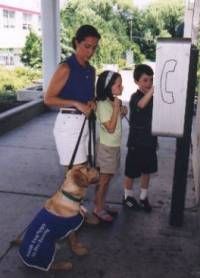Puppy Raisers
When they're ready to leave their mother, dogs that show a level of aptitude for guiding go to a loving home to enjoy being a puppy and grow into a well-trained young adult.
These volunteer puppy raisers are just ordinary people who go through an application process and training program at the guide dog school. The school screens for raising ability and works with puppy raisers one-on-one to help them learn how to work with the puppy. In addition, the school will generally provide the raisers with a manual and video that tells them almost everything they need to know. The raiser's job is to teach the puppy obedience skills, expose the puppy to all sorts of people and environments and give the puppy all the love and attention it needs to grow into a happy, confident dog that is ready for guide training. Basically, raisers lay the groundwork for the more extensive guide training to come.
Advertisement
One of the most important aspects of raising a future guide dog is to get it comfortable with all kinds of situations. Socialization is important for any dog, but it is crucial for guide dogs, who must be able to go anywhere without being distracted from their work. They must be accustomed to loud noises, adverse weather conditions, crowds of people and tricky obstacles. A guide dog needs to be confident in any situation its handler might experience. In Guiding Eyes for the Blind puppy raising programs, raisers typically expose the puppies to at least five new experiences a week.
In order to excel in advanced training later on, the puppy needs to get some experience with obedience early in life. Guiding Eyes for the Blind teaches puppy raisers to first develop a good working relationship with the dog. It is extremely important that future guide dogs are attentive and responsive to their handlers, and that they have the self-confidence to handle complex commands and stressful situations. The most important job of a puppy raiser is fostering these qualities.
Raisers also teach puppies the basics of obedience -- to sit, lie down and walk correctly on a leash -- and get them used to extensive training sessions several times a week. Raisers train the puppy using leash corrections and praise, never treat rewards. It's very important that a future guide dog not be fixated on food because when they're on the job, they will have to work without the expectation of a reward and they will have to maintain concentration in restaurants and other areas with food distractions.
Raising a future guide dog is a wonderful experience, but it is very difficult emotionally. At the end of the puppy raising period, a little over a year, the puppy raiser must bring the dog back to the training school so it can go on to help a blind or visually impaired person. Giving the dog up after raising it for a year is a very sad experience, but puppy raisers are rewarded by the satisfaction of contributing to the process. Most puppy raisers end up raising many future guide dogs, because of the happiness it brings them.
If you're interested in raising a future guide dog, check the links at the end of the article or look in the phone book for a guide dog school in your area. Guiding Eyes for the Blind has a number of puppy training programs set up on the east coast of the United States -- check Guiding Eyes Puppy Raising for a program in your area. Most schools have a comprehensive program that will teach you everything you need to know to start a guide dog off right. If you love dogs and have the time to care for a puppy, you can play a critical part in the guide dog training process.
